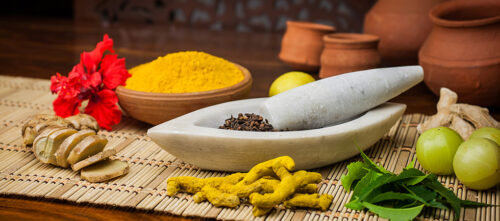Changing seasons can have an effect on your Doshas. That’s why it is important to understand your Dosha imbalances with each season and find the best practices that would help you to adapt and be in good health despite the changes. Kapha season usually refers to late winter and spring. The season is typically cold, damp and stagnant. Known as Shishira Ritu in Ayurveda, this is the season where Kapha Dosha gains dominance and your Agni (digestive fire) is at its peak. Identifying Kapha Kapha people are most likely to have a compact big-boned structure. They have deep-set eyes and strong hair, and tend to gain weight. Excessive Dosha can manifest as chest and lung or nasal congestions. It can also cause digestive problems due to a sluggish gut. Emotional factors might create overeating & end up in gaining weight. Kapha’s imbalance is also associated with sadness and emotional turbulence. It tends to favour a lethargic sedentary lifestyle. Individuals who have heightened the Dosha are likely to suffer from diabetes, gallstones, hypertension, varicose veins and oedema. Symptoms of Kapha imbalance A Kapha imbalance is usually marked by the following symptoms: Lethargy Excessive sleepiness Nausea Constipation Indigestion Ayurvedic tips to balance kapha Ayurveda works on the principles of Doshas – Vata, Kapha and Pitta. While each of us has a unique proportion of each of the Doshas, a predominant Dosha tends to increase more quickly than the others. Kapha season tends to bring on the qualities and symptoms of excess stagnation. Its dominance is represented as a heavy sluggish tendency, it is characterized by heaviness and slow gait. An imbalance in this can lead to stubbornness. Trying out new routines or interests can stimulate a lethargic mind. As per Ayurveda, a healthy balance can be restored by following a lifestyle, food regimen, and exercise pattern. A vigorous self-massage with warm organic sesame oil is prescribed to invigorate the stagnant Kapha. Sesame oil abhyanga aids in balancing Kapha Dosha. Kapha season is when the dosha is dominant. It is characterized by slow movements and grounding qualities. Those people who are prone to it must keep their feet warm and protect their chests from cold breezes. Opt for warm food and steer clear of raw food as well as frozen foods and beverages. The consumption of bitter and astringent tastes has lowering effects on it. Waking up before sunrise can also be very beneficial to a Kapha personality. Do not sleep late into the day. An early start can help balance this dosha . A glass of warm water can help activate your bowels and cleanse your body as a persons tend to suffer from constipation. Clearing of the nasal passage will provide relief from the symptoms. Ayurvedic tips to welcome the Kapha season Keeping warm is intrinsic to handling the Kapha season. Avoid cold and damp places. Consume warm meals, warm teas, warm water and nuts. Add Tulsi or mint leaves to your tea to stimulate the digestive system. Consumption of warm beverages and sipping hot water throughout the day help in heating and detoxifying. Stay warm. Move out of cold damp spaces and choose warm dry places. Kapha season tends to bring lethargy. It might herald the onslaught of depressive and stagnant thoughts and feelings. Ensure that you engage and rev up your psychological well-being. Another often-noticed fallout of the Kapha season is the lack of energy. It can get exacerbated due to stress and inadequate sleep. Its combat imbalance, therefore, with good sleep hygiene, can significantly improve energy levels Activity is crucial for balancing the dosha. Yoga can help significantly during the Kapha season. You can balance Kapha by combining pranayama with yoga to ensure sufficient circulation and strengthen the respiratory system. Alternate nose breathing works wonders for its imbalance. You can also incorporate Surya Namaskar into your yoga routine. Activate your body during the mornings and evenings with yoga and daily walks. Consume seasonal fruits like oranges, pears and apples. However, avoid very sour fruits. Also, do not consume heavy fruits like coconut, bananas, and dates. Incorporate turmeric, ginger, cinnamon, fennel, and nutmeg as they can help generate heat. These spices will pacify and stimulate the digestive system. Correcting Kapha imbalance Ayurveda can help you manage Kapha imbalance with lifestyle modifications and the right diet. Your diet must neutralize its properties. Since it is light and cool, warm and dry foods can help restore the balance. Foods that are light and spiced can help curtail the tendency to overeat. Heavy foods, on the other hand, tend to burden the system and, consequently, worsen Kapha symptoms. Oily and pungent foods aggravate Kapha. Kapha tends to produce plenty of moist mucus and it is therefore recommended to eat dry foods with minimal ghee or oil. You can include grains, beans and seeds. Ayurveda does not recommend consuming buttermilk and milk products during its season. Kapha is often aggravated by milk products. However, you can consider adding yoghurt or ghee to your diet. The consumption of wheat must be reduced too. Avoid processed foods and refined sugar. Sweets might increase the lethargic feeling. Refined foods have hardly any fibre; therefore, they can aggravate it Ayurvedic Herbs to Combat Kapha Dosha Ayurvedic herbs that can support Kapha include Trikatu, Bibhitaki, and Arjuna. People use bibhitaki, a traditional herb, to treat throat infections and other ailments related to its imbalance. Its anti-oxidant properties relieve stress and improve gastrointestinal functioning. Turmeric has significant antioxidant and anti-inflammatory properties. It works, therefore, as a soothing agent on the digestive system and, in addition, prevents the growth of yeast and bacteria. Ginger provides relief from digestive issues and nausea. It works on diseases such as poor digestion and, furthermore, sinusitis. You can welcome the kapha season with simple lifestyle routines such as slowing… Continue reading Kapha Time is Here! Ayurveda’s Secrets for Staying Balanced
Kapha Time is Here! Ayurveda’s Secrets for Staying Balanced



